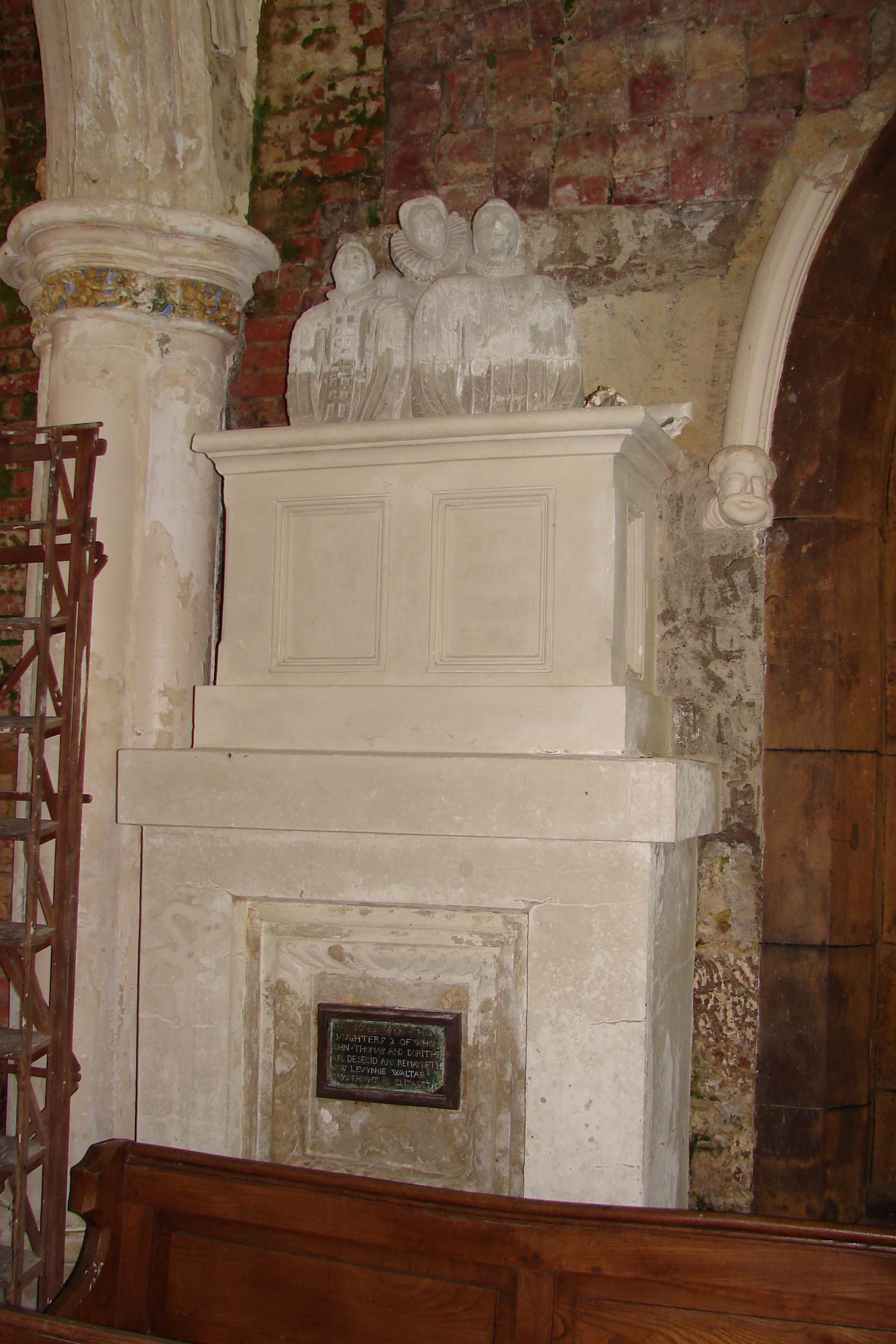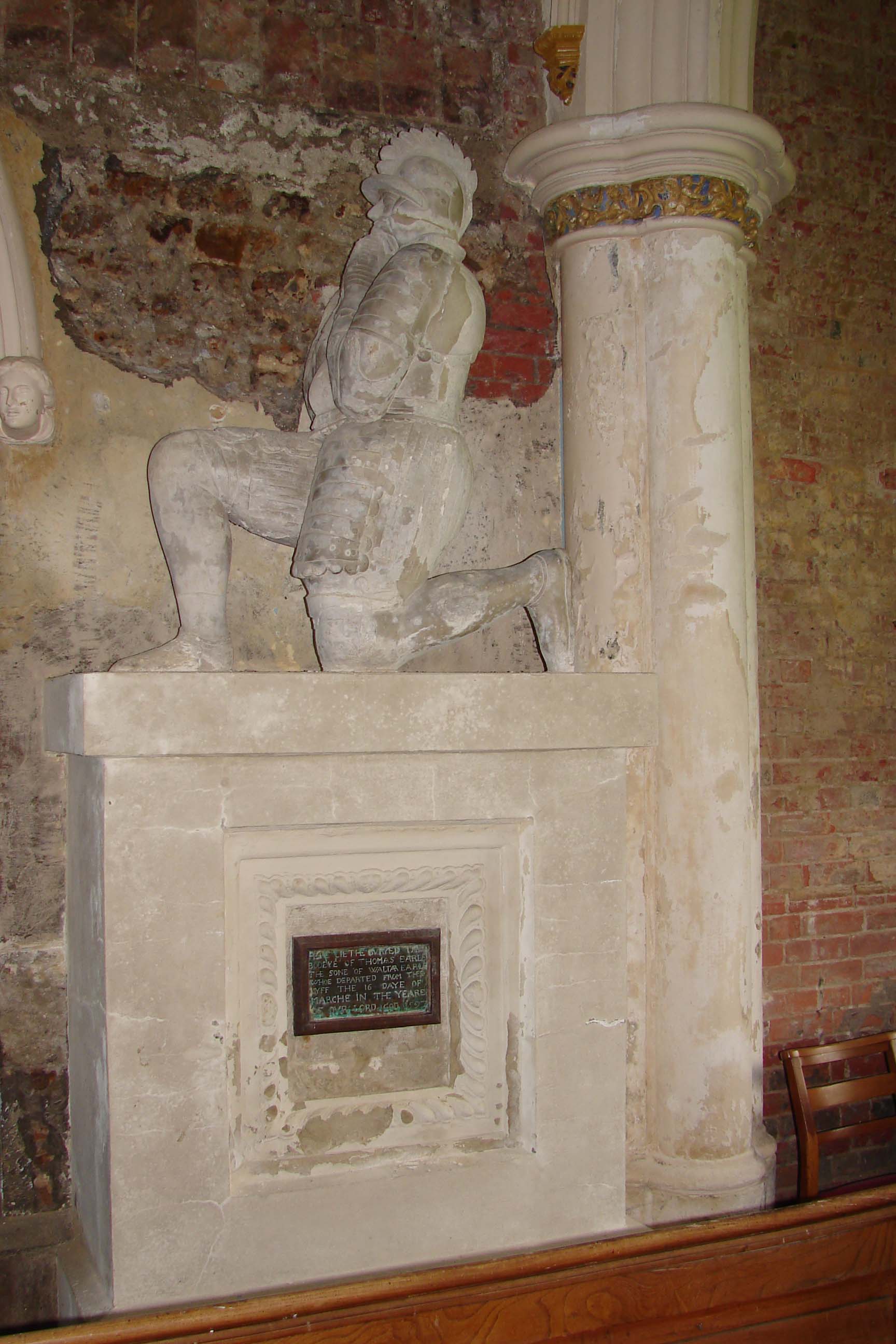
 Inside the church however are the remains of a monument to his father Thomas Earle and three of his children that predeceased him. It has been split in two with half each side of the entrance to the bell tower. The pictures opposite were taken by me on a visit to the church in 2008. The one on the right shows the figure of Thomas Erle in complete armour, on bended knee, in the act of homage. The original inscription read:-
Inside the church however are the remains of a monument to his father Thomas Earle and three of his children that predeceased him. It has been split in two with half each side of the entrance to the bell tower. The pictures opposite were taken by me on a visit to the church in 2008. The one on the right shows the figure of Thomas Erle in complete armour, on bended knee, in the act of homage. The original inscription read:- Here liethe buryed the bodye of Thomas Earle, the
sone of Walter Earle, whoe departed from this lyff the
16 daye of Marche in the yeare of our Lorde God 1597.
his sons wer 4, his daughters 2, of who me John
Thomas and Doritjie are desecid, and remayneth now
livynge Walter, Christopher, and Elizabeth.
The Walter referred to in this inscription is of course the subject of this short biography, but his brother Christopher Earle also invested in the Dorchester Company as did the husband of his sister Elizabeth who was wife to Sir Richard STRODE in Devon.
He was also a friend of the Rev John White an investor in and prime mover behind the Dorchester Company for which he became Governor and secured an indenture for colonisation in New England. His interest in this area however was deep rooted as he and his brother Christopher had shares in the Virginia Company as far back as 11 May 1620 and it is known that he attended the meeting of that company on 21st May 1621, that is after the establishment of the Council for New England. He is also listed among the friends and associates of Walter YONGE in the account of his diary.
He was also one of the Justices of Peace for Dorset sitting at the Quarter sessions which rotated between Beaminster, Blandford Forum, Sherborne, Shaston and Dorchester and therefore involved in handing out typical sentences of the day. For example in 1626 between 10th and 12th January we find him at Blandford Forum where Bartholomew FORDE, Anthony DUNFORD, English TUCKER, John MARTIN and Simon CORNISH were all branded, ,William WYATT, Robert JOHNSON and Ethelred JOHNSON were whipped and then released whilst Thomas SYMONDES was stocked at Blandford for four hours and then released. His service as a JP however was at this point interupted.
He was a vigerous opponent of Charles I in Parliament and perhaps one of the most important events in his life arose in 1626/7. The Commons having failed to pass a bill for subsidies, the King was left virtually destitute. He therefore demanded a general loan, for the raising of which each person was to be assessed according to his rate in the previous subsidy and Charles appointed a commission to take charge of the business. The Earle of Suffolk and Sir Robert Nanton master of the Court of wards came down to Dorset to demand subscription from those selected. William Whiteways diary for the 13 January 1626/7 states that 'All men in this county subscribed except Sir John Strangeways, Sir Walter Earle, Mr Tregonwell, and Mr William Savidge attorny. These 4 were for refusing bound to answer it at the Council table, from whence the three former were sent prisoners to the fleete and the last unto the new prison in Clarkenwell'. He was to languish in prison for almost a year until on 22 Nov 1627 when they obtained a Habeas Corpus out of the Kings bench demanding to be tried there. Mr Ley thier chief Lawyer defended them so well that they convinced the bench of their rights but the Kings attorny craved time to consult Charles. The importance of this case, being against the King as it was, cannot be overstated as a cornerstone of safeguarding a right we often take for granted today. Even so it was not until 11 January 1628 that he was released.
In 1633 he resumed his duties as a JP sitting a total of 15 times up to the year 1638. Given this background it is not suprising to find him opposing Charles in the field during the Civil War when he was a parliamentary colonel. In 1642 it was decided to fortify Dorchester against the King and a considerable amount of money was borrowed for that purpose. Between 13th Nov 1642 and 20 July 1643 a total of £14,689 -11-10d was borrowed from the County Treasury and Sir Walter Earle along with others such as John Browne and Dennis Bond stood surity at 8% interest. In 1643 he was military governor of Dorchester for parliament and Lieutenant of Ordnance. His prowess in this area however was not great as he was repulsed in August 1643 by the redoubable Lady Bankes in his assault on Corfe Castle and fled from Dorchester at the approach of the Royalists under Lord Carnarvon. Carnarvon was said to have near 2,000 horse and dragoons and the town elected to send commissioners to treat with him and surrendered as the fortifications so far completed were felt inadequate and townspeople no match against an Army with canon. Sir Walter Erle and Colonel Strode fled by sea to Southampton.
Sources: DH: DV: OXA: PRO: QS: RT: WW: [In the notes on Sir Walter Erle made by Thomas D Murphy at the end of the diary it states he was made a Knight of the shire in 1626 and sherrif 1628. For the sake of clarity he was knighted on 4 May 1616 see RT and OXA and within the diary itself on page 23 for the year 1618 it shows he was a Knight when he was made sheriffe of Dorset that year. He was elected Knight of the shire in 1628]: A Genealogy of Heraldic History of Commoners of Great Britain and Ireland by John Burke Esq Volume IV.